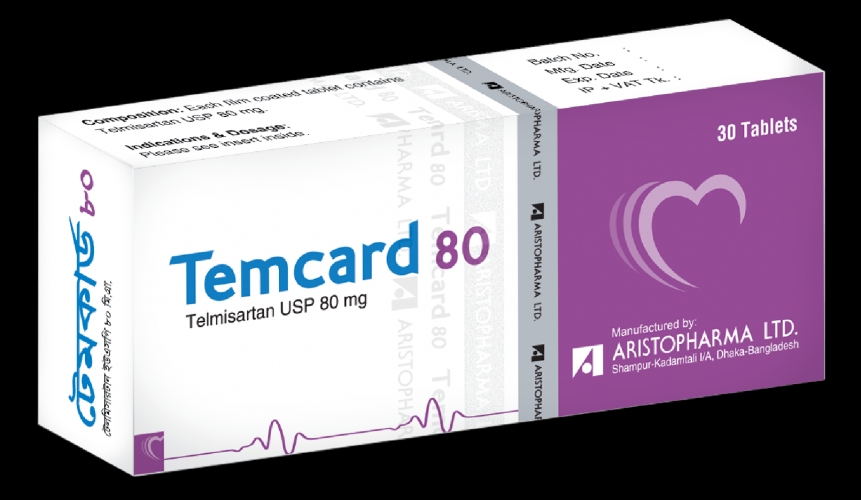ঔষধের বিস্তারিত বা বিকল্প ঔষধ জানতে ঔষধের নাম দিয়ে সার্চ দিন। যেমন- Napa বা Alatrol বা Amodis
Temcard 80mg
TabletTelmisartan
Aristo pharma
Other Strength:
- Temcard 20mg
- Temcard 40mg
Alternative:
- Arbitel 80mg
- Telmilok 80mg
- Telisa 80mg

Temcard
Presentation:
- Temcard 20 Tablet: Each film coated tablet contains Telmisartan USP 20 mg.
- Temcard 40 Tablet: Each film coated tablet contains Telmisartan USP 40 mg.
- Temcard 80 Tablet: Each film coated tablet contains Telmisartan USP 80 mg.
Pharmacology:
Telmisartan blocks the vasoconstrictor and aldosterone-secreting effects of angiotensin II by selectively blocking the binding of angiotensin II to the AT1 receptor in many tissues, such as vascular smooth muscle and the adrenal gland. Its action is therefore independent of the pathways for angiotensin II synthesis. Telmisartan has much greater affinity (>3,000 fold) for the AT1 receptor than for the AT2 receptor. Because Telmisartan does not inhibit ACE (kininase II), it does not affect the response to bradykinin. Telmisartan does not bind to or block other hormone receptors or ion channels known to be important in cardiovascular regulation.
Indications:
Temcard is indicated for the treatment of hypertension, to lower blood pressure. Lowering blood pressure reduces the risk of fatal and nonfatal cardiovascular events, primarily strokes and myocardial infarctions.
Temcard is also indicated for Cardiovascular (CV) risk reduction in patients unable to take ACE inhibitors
Dosage & Administration:
For hypertension: The usual starting dose of Temcard tablet is 40 mg once a day. Dose can be increased to 40 mg to 80 mg once daily if
necessary. Blood pressure response is dose-related over the range of 20 to 80 mg. For cardiovascular risk reduction: The usual starting dose of Temcard is 80 mg once a day. No initial dosage adjustment is necessary for elderly patients or patients with renal impairment, including
those on hemodialysis. Patients on dialysis may develop orthostatic hypotension; their blood pressure should be closely monitored.
Temcard tablet may be administered with other antihypertensive agents. Temcard tablet may be administered with or without food.
Adverse Reactions: The most common side effects of Telmisartan tablet include: upper respiratory tract
infection, back pain, sinusitis, diarrhea, pharyngitis etc.
Contrainidications:
Telmisartan is contraindicated in patients with known hypersensitivity to Telmisartan or any component of this
product.
Warning & Precautions:
Fetal toxicity: Use of Telmisartan increases fetal and neonatal morbidity and death. Hypotension: Symptomatic hypotension may occur after initiation of Telmisartan in patients treated with high dose of diuretics. Hyperkalemia: Hyperkalemia may occur in patients on ARBs, particularly in patients with advanced renal impairment, heart failure, on renal replacement therapy or on other drugs that increase potassium levels. Impaired hepatic function: As majority of Telmisartan is eliminated by biliary excretion, patients with biliary obstructive disorder or hepatic insufficiency can be expected to have reduced clearance. Initiate Telmisartan at low dose and titrates slowly in these patients. Impaired renal function: As Telmisartan inhibits renin-angiotensin-aldosterone system, changes in renal function in susceptible patients can be anticipated.
Drug interaction:
Aliskerin: Avoid use of aliskerin with Telmisartan in patients with renal impairment (GFR<60 Ml/min). Digoxin: When Telmisartan is
co-administered with digoxin, increase in digoxin plasma concentration is observed.
Lithium: Increase in serum lithium concentration is observed when lithium is co-administered with
Telmisartan.
NSAIDs: Antihypertensive effect of Telmisartan may be attenuated with NSAIDs.
Use in special groups:
- Pregnancy: When pregnancy is detected, discontinue Telmisartan as soon as possible.
- Lactation: It is not known whether Telmisartan is excreted in human milk.
- Pediatric use: Safety and effectiveness of Telmisartan in pediatric patients have not been
established.
- Geriatric use: No overall differences in effectiveness and safety were observed in
these patients compared to younger patients.
- Hepatic impairment: Monitor carefully and up
titrate slowly in patients with biliary obstructive disorders or hepatic insufficiency.
- Renal impairment: No initial dosage adjustment is necessary for elderly patients or patients with renal impairment, including those on emodialysis.
Storage:
Store below 250C. Protect from light and moisture. Keep out of the reach of children.
এই পাতাটি ২২৮ বার দেখা হয়েছে
রাজডক কী?
ফ্রী সদস্য হোন Click Here
ডাক্তার হিসাবে যোগদান করতে Click Here
নার্স / টেকনোলজিস্ট হিসাবে যোগদান করতে Click Here
ফ্রী সদস্য হোন Click Here
ডাক্তার হিসাবে যোগদান করতে Click Here
নার্স / টেকনোলজিস্ট হিসাবে যোগদান করতে Click Here

